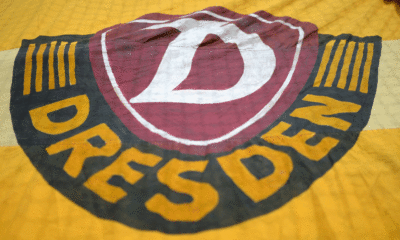Bundesliga
FC Bayern Munich historically bad? Before 2013 this was quite normal
Published
11 months agoon
By
Maria Keane
FC Bayern Munich is currently pretty bad, everyone agrees. But how bad is the German record champion really? A historical classification.
The history of FC Bayern Munich has to be divided into a period before and after the 2012/13 season. Before that, the Bundesliga was an exciting competition with various winners. It’s been a one club show ever since. If the Munich team doesn’t really do everything wrong at the same time, they still somehow become champions.
After ten championship titles (and five wins in the DFB Cup during this period, by the way), it could actually be time. Failed transfers, a strange change of coach, public fuss about the captain, a physical altercation between two players and all the other hot spots: all together it was probably too much.
One game day before the end of the season, FC Bayern is two points behind Borussia Dortmund in the table. Should BVB win against FSV Mainz 05 at home on Saturday, they will be champions. It doesn’t matter what FC Bayern is doing at 1. FC Köln at the same time.
FC Bayern Munich: The points yield in comparison
The Munich team currently has 68 points, so they can still reach a maximum of 71. There were fewer in the 2010/11 season (65). Under Jupp Heynckes and Pep Guardiola, FC Bayern even broke the 90-point mark twice.
Looking back over the past ten years, the 71 points that are still possible seem alarmingly small. In the 17 seasons between the introduction of the three-point rule in 1995 and the start of dominance in 2013, the Munich team only surpassed this value six times and never scored more than 80 points. 71 points were often enough for the title.
If you convert the previous point counting method into today’s, FC Bayern never had more than 80 points before the 2012/13 season. The maximum of the golden team around Kaiser Franz Beckenbauer and bomber Gerd Müller in the 1970s was twice the equivalent of 79 points.
What used to be quite normal for FC Bayern now seems historically bad – to bosses, players, fans and journalists alike. Munich’s absurd sense of entitlement in modern times results on the one hand from the truly impressive achievements of the past decade and on the other hand from the ever-increasing financial advantage. The Bundesliga teams used to be closer together in terms of quality, so the difference in points in the table was correspondingly smaller.
FC Bayern: The record in the tight title fights
During this time, today’s substitute captain Thomas Müller grew up in Pähl in Upper Bavaria as a big fan of FC Bayern. When asked what still gives him hope in the current situation, Müller said on Saturday: “I’ve experienced enough – mainly as a fan, of course, when the championships were very close every year.” Because of the usually significantly lower number of points of the masters compared to today, it used to be really exciting until the end.
Since the introduction of the three-point rule in 1995, the title fight was still open six times before the last matchday. This only happened once after the beginning of Munich’s permanent dominance. In 2018/19, FC Bayern only secured their title ahead of BVB on the last day of the game, but completed this task quite confidently at the time.
The Munich side were involved in four of the previous five tight championships, only when VfB Stuttgart won the title in 2006/07 were they too far behind before the last matchday. FC Bayern had the better end twice: in 2000 in a long-distance duel with Bayer 04 Leverkusen and in 2001 with FC Schalke 04. In 2002 the Munich team had to give way to Dortmund and in 2009 to VfL Wolfsburg. The well-told story that FC Bayern used to be cold-blooded in the close title fights is therefore a myth.
FC Bayern: This is how the golden 1970s ended
Should the Munich team have to cede the bowl to Dortmund this time, that would actually only be half as bad in view of the club’s history. At the deepest lows, FC Bayern usually provided the right impetus – of whatever kind.
When the golden 1970s ended in chaos and a temporary fall to the bottom half of the table, the team rebelled against long-time club president Wilhelm Neudecker in early 1979. As punishment for the poor performance, Neudecker wanted to hire Max Merkel as the new coach. The Felix Magath of his time, nickname: Whip-slinger.
But the players didn’t want to do that. They threatened a strike, Neudecker resigned, the former assistant coach Pal Csernai was allowed to remain in office and in the background the young manager Uli Hoeneß became the most important man in the club. After five years without a championship title, FC Bayern then won the Bundesliga twice in a row.
FC Bayern: Impulses from new bosses, coaches and players
An extremely successful decade followed before Bayern hit another low point in the 1991/92 season. Out of the DFB Cup against FC 08 Homburg, out of the UEFA Cup against a Danish club called Boldklubben 1903, at times a relegation battle in the Bundesliga. In desperation, FC Bayern also brought Karl-Heinz Rummenigge into the management team together with Franz Beckenbauer that season, who from then on would lead the club to new heights together with Hoeneß.
Missing out on the Champions League in 2007 was followed by a successful transfer offensive which, among other things, gave Bayern Munich long-standing key player Franck Ribéry. Also in the recent past, an ingenious decision was made at a low point: After a 1: 5 against Eintracht Frankfurt in autumn 2019, Hansi Flick succeeded Niko Kovac as head coach. Shortly thereafter, the club won its second treble.
Sometimes there was a new boss, sometimes a new coach, sometimes new players – mostly the Munich team was right with their decisions in dire need. This time coach Thomas Tuchel should have his job, regardless of the outcome of the Bundesliga. Thus, only the management level and the management come into question for major changes.
Bundesliga: The top of the table
| Place | team | Sp. | Gates | differential | pt. |
| 1. | Borussia Dortmund | 33 | 81:42 | 39 | 70 |
| 2. | Bayern Munich | 33 | 90:37 | 53 | 68 |


Test match tournament on free TV and live stream
In preparation for the upcoming start of the season in the 2nd and 3rd divisions, SpVgg Unterhaching is organizing a...


Test match on free TV and live stream
Third division club Dynamo Dresden are testing today against top Czech club Slavia Prague in preparation for the upcoming start...


When does the season start?
It’s warm and sunny outside, but you just want to watch football again? Then get in the mood for the...

